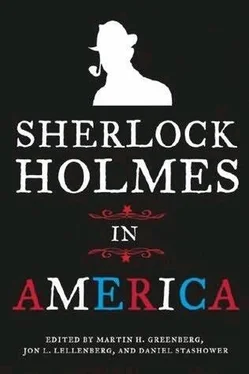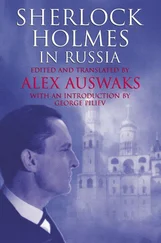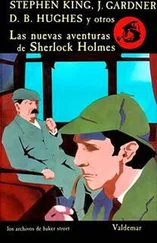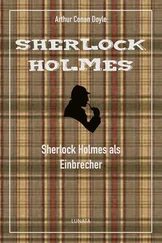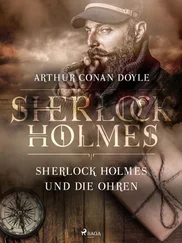“Bess is right, Harry,” I said. “Don’t mess this up. We need the money. Keep your mind on your act.”
“I shall perform my duties with my usual skill and professionalism,” said Harry. “Of that you may be assured.” His voice took on a faraway quality. “The stage lost a fine actor when I became a specialist in crime.”
“Harry… ”
But he sank back in his seat and would say nothing more.
We were riding a horsecar down Seventh Avenue, with our collars pulled up against a stiff autumn wind. Bess wore a long cloak over the gauzy outfit that I always thought of as her “sugarplum fairy” costume, designed to show her legs to advantage. “I’m freezing,” she said, pulling the folds of the cloak tighter. “I hope Mr. Patrell has managed to find a warm spot this time. Do you remember when he was running the show out of an old fish market? I thought I’d never get the smell of mackerel out of my hair.”
Patrell’s Wonder Emporium had occupied dozens of locations over the course of its twenty-year history. It began as a tent-show on the outer reaches of Central Park, in the days when Wild West demonstrations were still a familiar summer entertainment. Gradually, Patrell took his business downtown in hopes of attracting patrons throughout the year. It was his custom to swoop down whenever a warehouse or dry goods concern went out of business, buying up the remainder of the owner’s lease at a discount and setting the run of his show accordingly.
We alighted at 14 thStreet and approached the Wonder Emporium from the west. From half a block away we caught sight of the banner line, a row of brightly-painted canvas panels depicting the “wondrous and edifying” novelty acts presented within-a bearded lady, a contortionist, a frog boy, a “Wild Man of Borneo,” a snake charmer, a living skeleton, a “genuine leprechaun,” a fat lady, a sharp-shooter, and a King of Kards. It should be admitted that the illustrations were eye-catching but also highly fanciful. The leprechaun, for example, was depicted as standing in the palm of a normal-sized man, brandishing his tiny hat and dancing a merry jig. “A tiny marvel!” read the bold, up-tilted caption. “Will you find his pot of gold?” The actual performer-Benjamin Zalor, with whom I often played a hand or two of whist-stood somewhat over four feet. If he had ever owned a pot of gold, he neglected to mention it to me.
“That looks nothing like me,” said Harry, pointing to the panel depicting the King of Kards. This was certainly true. The figure on the canvas panel resembled a blond Satan, with playing cards shooting from his fingertips like lightening bolts. A trio of undersized red imps were seen cowering at his feet, averting their eyes.
“These are just stock images,” I said. “Show people come and go. Patrell couldn’t possibly have a new banner painted each time his snake charmer gets a better offer. None of these illustrations looks anything like the actual performer.”
“I know that,” said Harry, “but my public will be disappointed.”
We had only twenty minutes until the start of the first show, and Patrell was waiting for us at the door. He led us inside and showed us to a makeshift stage-a narrow platform fronted with red and blue bunting that ran along one wall below a line of windows. The other performers had already taken their places on stage, waiting for Patrell to drum up the day’s first audience. The proprietor made hasty introductions, then showed Harry and Bess to their place on the platform, between the living skeleton and the snake charmer.
This done, Patrell pulled out a large silver turnip watch at the end of a chain. “Five minutes, ladies and gentlemen!” he announced. “Dash,” he said, turning to me. “Would you mind filling as frog boy?” He gestured to a strange assemblage of wood and cloth at the third position on the platform. At the center stood a raised column painted to resemble a tree stump. If you settled yourself behind the stump in a sort of crouch and poked your head through a hooded yoke of green cloth, it created the impression of a human head atop an elongated frog body. It was a nice effect, but tough on the knee joints.
“Don’t tell me,” I said, “Addison Tate was also filling the frog boy slot?”
“No,” said Patrell. “Actually, we hired a young lady last month. Mathilda Horn. Lovely girl, but she hasn’t turned up yet. I believe last night’s events may have unsettled her.”
“I’ll need three dollars a week, just like my brother.”
“Two.”
“Two-fifty.”
Patrell snorted as he reached into his pocket for a walnut. “Dash, it’s not a talent slot.” He picked up a rock from the “Wild Man of Borneo” exhibit and cracked the nut with it. “Your mother could do the frog boy act. I’m offering you two dollars a week until Miss Horn returns. What do you say?” He held out the cracked walnut and I helped myself to half.
“Ribbit,” I said.
The next three weeks passed pleasantly enough as we fell into the routine of the Ten-in-One. We did modest business throughout the afternoons, but drew rather larger and more boisterous crowds in the evenings, when young couples could be relied upon to be strolling past on their way to the theater or a dinner. I made myself useful by filling various slots behind the scenes as well as on the platform. After a couple of days, when Mathilda Horn returned to take up her duties as frog boy, I was promoted to the sharp-shooter slot recently vacated by Addison Tate. I should confess that I do not possess any native skill with a pistol, but the international success of Miss Annie Oakley-“The Peerless Little Sure Shot”-had created a public demand that every dime museum and carnival in America was now obliged to fill. Though I have never handled a live firearm in my life, only blank cartridges, I found as many others had done that sleight of hand offered an acceptable substitute. In my version of the sharp-shooter act, a volunteer from the audience made a selection from a deck of playing cards. After an appropriate interval of shuffling and cutting, I invited the spectator to throw the entire pack into the air. As the loose cards fluttered down, I gave a wild cry-the Rebel Yell, as interpreted by the son of an Orthodox rabbi-and fired my pistol. In short order the selected card was found to have a bullet hole in its center. The act drew enthusiastic applause whenever I performed it, but suffice it to say that Little Sure Shot had nothing to fear from me.
Harry, meanwhile, was doing yeoman service with his card manipulations, delighting the crowd with flashy overhand shuffles and hand-to-hand cascades, followed by platform effects such as the rising cards and the vanishing bird cage. If at times his stage manner appeared stiff, if not wooden, his audiences were generally forgiving. This may have had something to do with the pleasant addition of Bess striking poses at his side. She was easy on the eyes, I don’t mind telling you.
Between shows Harry took every opportunity to make enquiries about the disappearance of Addison Tate. As a rule he did not mingle easily with other performers, but his path was greatly smoothed by the trays of pecan rolls that our mother sent along each morning for fear that our new friends-especially Mr. Grader, the living skeleton-were not getting enough to eat. Even so, Harry’s attempts to strike up even the most casual conversation had the sound of a man practicing a new language. “Say, did you happen to see the newspaper this morning?” he would ask. “I see that Jimmy Sheckard got yet another hit for the Brooklyn Bridegrooms! He certainly is handy with a baseball bat, is he not? I wonder, was Addison Tate fond of baseball? Whatever happened to him, do you suppose?”
If these forays lacked subtlety, it emerged that our colleagues were not at all reluctant to discuss the abrupt departure of Mr. Tate. It was the custom of the performers to withdraw into a back room and pass around flasks of tea between shows. As the days progressed, the tea gave way to stronger restoratives, and the conversation flowed more freely. By the end of the second week, our new friends had advanced no fewer than a dozen explanations for Addison Tate’s behavior, ranging from brain fever to a sudden impulse to run off and join the French Foreign Legion. “If you ask me,” said Emma Henderson one afternoon, pulling off the “Bearded Lady” chin piece she wore, “he was up to no good from the moment he got here. I always saw him sneaking around behind the platform. Very odd, I call it.”
Читать дальше
